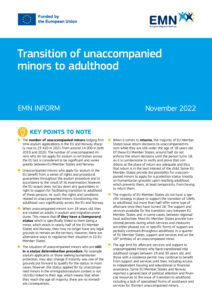What measures, structures and systems are in place in the EU Member States and Norway to provide transitional support to unaccompanied minors after reaching the age of majority? This new EMN inform investigates the legal transition that unaccompanied minors face as they age out of care systems envisaged to protect (all) children and adolescents deprived of parental care in the EU and Norway.
The transition to adulthood of a young person refers broadly to the process of them reaching adult age, thus transitioning from dependency to autonomy and living as a full member of society. Unaccompanied minors face a double transition: not only from childhood into adulthood, but also, possibly, a change to their status, which can impact on their right to stay, and the extent to which they can access education, housing, employment, services, and support.
The EU has been actively working to protect the rights of unaccompanied minors for decades, and those who apply for asylum in the EU benefit from a series of rights and procedural guarantees throughout the asylum procedure and in accordance with the result of its examination, However, the EU acquis does not lay down any guarantees or rights to support the transition to adulthood of these persons. As such, the rights and conditions related to unaccompanied minors transitioning into adulthood vary significantly across the EU and Norway.
